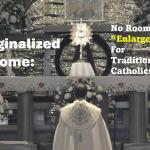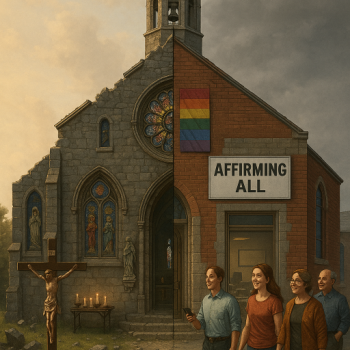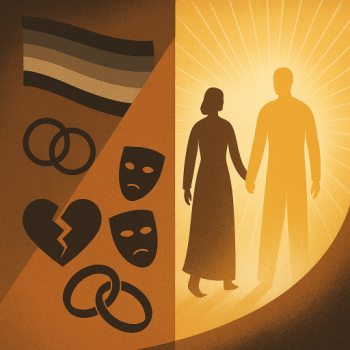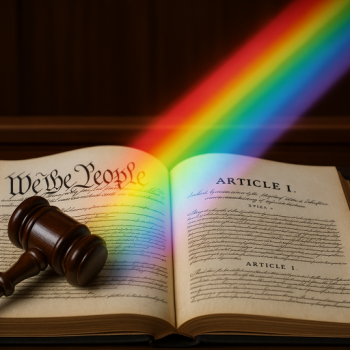The current messaging coming from the Vatican baffles me. The Vatican appears to stand by while some bishops (especially in Germany) seek to change Catholic moral teaching. Pope Francis elevates cardinals among American prelates that dissent from Catholic moral teaching. Moreover, the Pope overlooks more faithful bishops and archbishops of dioceses that traditionally hold cardinals. The Pope labels “conservative” American Catholics ideologues. Young, more traditional priests, he labels too “ridged” or someone where “something bad is happening…on the inside.” And now we read of the eventual request for resignation of Tyler Bishop Joseph Strickland.
In this article, I examine each of these moves by the Vatican and ask: what message do these moves convey to the Catholic faithful? In truth, the recent moves by Pope Francis and the Vatican have demoralize a vast number of Catholic faithful. Moreover, with all the controversy over Bishop Strickland, one fact seems overlooked: the actions taken by the Vatican created the environment for a Strickland to emerge.
Questioning the Vatican and Pope Francis: Canon 212
First, a word on whether the Catholic faithful have the right, under Church law, to question the Vatican and Pope Francis. Not only do the faithful have a right, but they also have a duty to do so. Canon 212 states:
According to the knowledge, competence, and prestige which they [the faithful] possess, they have the right and even at times the duty to manifest to the sacred pastors their opinion on matters which pertain to the good of the Church and to make their opinion known to the rest of the Christian faithful, without prejudice to the integrity of faith and morals, with reverence toward their pastors, and attentive to common advantage and the dignity of persons.
When the good of the Church seems in peril, the faithful have a right and a duty to express their concerns to their pastors, including bishops, and even the Pope. And when these pastors call into question issues of faith and morals, the need to speak up increases exponentially.
A Light Touch with Germany
Given the extreme dissention of the Catholic Church in Germany, the response from the Vatican seems tame. Thus far, the Vatican released one official rebuke issued by the then named Congregation for the Doctrine of the Faith against blessing same-sex couples. Furthermore, only one bishop resigned and this was due to his mismanagement during the sex abuse crisis. Surprisingly, The National Catholic Reporter reports that six German bishops have offered their resignation to Pope Francis over the past few years and each, except Bishop Franz-Josef Bode, were rejected. One of those, Cardinal Reinhard Marx, called for a change in the Catechism regarding homosexuality and called homosexuality “not a sin.” To reiterate, Cardinal Marx publicly teaches contrary to Church moral teaching (among other troubling things) and also offered his resignation to Pope Francis, yet Pope Francis declined to accept it. Demoralized yet?
The Elevation of Dissent in America
Moreover, the Pope has elevated to “princes of the Church” prelates that question or directly contradict Church moral teaching. Below are the comments of two American cardinals, created by Pope Francis, dissenting from official Church teaching.
…the church must embrace a eucharistic theology that effectively invites all of the baptized to the table of the Lord, rather than a theology of eucharistic coherence that multiplies barriers to the grace and gift of the eucharist. Unworthiness cannot be the prism of accompaniment for disciples of the God of grace and mercy.
And
While Catholic teaching must play a critical role in the decision making of believers, it is conscience that has the privileged place. Categorical exclusions undermine that privilege precisely because they cannot encompass the inner conversation between women and men and their God.
“But how can you welcome people that you call ‘intrinsically disordered?'” Thompson asked.
“Well, I don’t call them ‘intrinsically disordered,'” Tobin answered.
“But isn’t that the Catechism of the Catholic Church?” Thompson asked.
“That is,” Tobin said, adding “it’s very unfortunate language. Let’s hope that eventually that language is a little less hurtful.”
Pope Francis passed over for consideration two faithful prelate, Archbishop Jose Gomez and Archbishop Salvatore Cordileone, the former from a diocese known for creating cardinals. Before Gomez, the archdiocese of Los Angelese had three archbishops elevated to cardinal. Demoralized yet?
The Problem with Catholic Ideologues
Recently, Pope Francis criticized what many observers identify as conservative Catholics in the United States. The Pope states:
You have seen that in the United States the situation is not easy: there is a very strong reactionary attitude. It is organized and shapes the way people belong, even emotionally. I would like to remind those people that indietrismo (being backward-looking) is useless…
And
You have been to the United States and you say you have felt a climate of closure. Yes, this climate can be experienced in some situations. And there you can lose the true tradition and turn to ideologies for support. In other words, ideology replaces faith, membership of a sector of the Church replaces membership of the Church.
Moreover, these comments inspired/demoralized some Catholics to pen articles, like Jayd Henricks at First Things, who laments Why Does the Pope Dislike Me? Mr. Henricks sums up the feeling of most “conservative” US Catholics (including this one) when he observed:
As the Francis papacy unfolds, an increasing number of Catholics sense that he is not friendly to them: those who are struggling to tithe and raise large families; those who are practicing NFP instead of contracepting; those who are struggling for holiness and chastity while living with same-sex attraction; those who are making heroic sacrifices to stay in good standing with the Church in order to receive the Eucharist . . . the list could go on. None of these Catholics are living “by ideologies”—they are striving to live by the teaching of the Church, just as the Holy Father is—even if he doesn’t like us.
Feel demoralized yet?
Young Priests and Seminarians with “Something Wrong” on the Inside
And what of young energic seminarians and priests who take their vocation and the health of the souls in their care seriously? There is something bad happening to them on the inside, well, according to Pope Francis anyway. This concern led Pope Francis, in 2016, to conduct a review of seminary formation and issue a training document through the Congregation for Clergy to root out “presumed theological or disciplinary certainty,” among other undesirables. Section 120 lays out the focus for seminarians and priests, moving forward. In the last paragraph, we read:
The gaze of the Good Shepherd, who seeks out, walks alongside and leads his sheep, will form a serene, prudent and compassionate outlook in him. He will exercise his ministry with a disposition of serene openness and attentive accompaniment in all situations, even those that are most complex, showing the beauty and the demands of the Gospel truth, without falling into legalistic and rigorist obsessions. In this way he will know how to offer pathways of faith with little steps, that can more easily be understood and accepted.
Clearly, the focus here is for a more “pastoral” approach. We also see key words that many who dissent from Catholic moral teaching use, like “openness” and “accompaniment,” to justify their dissent. For the record, nothing heterodox appears in the above paragraph. The concern surrounds how dissenters within the Church use concepts, like “openness” and “accompaniment,” to further their agenda. I know this makes me feel a bit demoralized.
The Vatican’s Moves Created Bishop Strickland
Finally, let’s address the current situation with Bishop Joeph Strickland of Tyler, Texas. On September 11th, 2023, The Pillar reported that Pope Francis met with topic Vatican officials to discuss the possible resignation of the outspoken bishop. For this article, the actions of Bishop Strickland, which led to potential dismissal, will not be covered. Others, like Micheal Lofton at Reason & Theology, continue to cover the bishop’s actions. Often under reported by Catholic commentators is that fact that Bishop Strickland’s actions were actually reactions to actions and inactions on the part of the Vatican and Pope Francis; for example with the Synod of Synodality. In discussing his recent Pastoral Letter, the bishop addressed why he chose to speak up when others remain quiet.
All of us have read a lot and heard comments from cardinals, priests, and some bishops. A lot of commentaries. There just seemed to be some clearly laid out issues that that I had a concern about. I heard from enough people it just reached a point where I felt like needed to speak.
Moreover, in a recent interview with LifeSite News, when basically asked “why him,” Bishop Strickland stated:
You look at scripture. You look at so many examples. You look at the 12 apostles. I mean, God chooses the unlikely, little, meaningless, forgotten of the world. God says, “I’m going to use this one” and you know that’s sort of a scary acknowledgment. I’m a very frail and broken and weak instrument but I feel God using me. And I qualify as nothing, you know. God takes nothing and makes something out of it through his grace.
It’s [truth] spoken of by people high in the church as if it was horrible shackles and diminishing our abilities to live in the human community. Get rid of this dogma. This doctrine, these teachings, that’s devastating.
I can’t quit speaking of the beauty of what God calls us to.
Cleary, Bishop Strickland feels called to speak out to speak the truth. He may suffer for this. Conversely, if Pope Francis were as clear as the previous two popes in explaining and affirming the Catholic teachings defended by Bishop Strickland, he would just be a obscure bishop in a small Texas diocese. In a sense, the Vatican’s moves created Bishop Strickland. How can this not demoralize?
Final Thoughts…
In conclusion, questioning the Pope does not constitute a sin. As pointed out, according to canon 212, when the faithful see issues concerning faith and morals, by right and duty, they are required to question. Furthermore, when decisions by the Vatican appear to reward those who dissent and chastise the faithful, how are the faithful not demoralized? I surely am.
Thank you!
Read The Latin Right’s other writing here.














